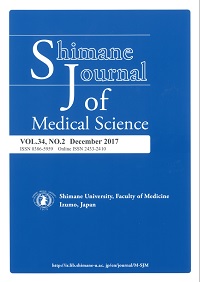Shimane University Faculty of Medicine
ISSN :0386-5959(in print)
ISSN :2433-2410(online)


These article are licensed under a Creative Commons Attribution-NonCommercial-NoDerivatives 4.0 International License.
number of downloads : ?
Use this link to cite this item : https://ir.lib.shimane-u.ac.jp/40546
Shimane Journal of Medical Science 34 1
2017-07-31 発行
Effect of Surgical Instruments on Cytological Features: A Pilot Study of Mouse Tongue Cancer Models
Itohara, Chieko
Department of Oral and Maxillofacial Surgery
Hideshima, Katsumi
Department of Oral and Maxillofacial Surgery
Sekine, Joji
Department of Oral and Maxillofacial Surgery
File
Description
Rapid intraoperative cytology is a common method for examining resection margins in cancer surgery. Cytopathologists often face challenges with cytological diagnoses because of cell degeneration by electric scalpels. This pilot study sought to elucidate the effect of surgical instruments on cytological features.
Mouse models of tongue SCC were used (n = 10). Tumor was excised using a stainless-steel scalpel (n = 2, SS), electronic scalpel (n = 2, ES), or ultrasonic scalpel (n = 2, HS). Imprint cytology specimens from resected tumor were subjected to Papanicolaou (Pap) or Giemsa staining. Remaining tissue was stained with hematoxylin and eosin. In SS specimens, heat-induced cell degeneration was observed less extensively than in ES. In perioperative rapid intraoperative cytology examination, surgeons should consider the possibility of changes in cellular morphology depending on the type of surgical instrument used. The cytopathologist should also be informed about the instrument used to resect the specimens.
Mouse models of tongue SCC were used (n = 10). Tumor was excised using a stainless-steel scalpel (n = 2, SS), electronic scalpel (n = 2, ES), or ultrasonic scalpel (n = 2, HS). Imprint cytology specimens from resected tumor were subjected to Papanicolaou (Pap) or Giemsa staining. Remaining tissue was stained with hematoxylin and eosin. In SS specimens, heat-induced cell degeneration was observed less extensively than in ES. In perioperative rapid intraoperative cytology examination, surgeons should consider the possibility of changes in cellular morphology depending on the type of surgical instrument used. The cytopathologist should also be informed about the instrument used to resect the specimens.
About This Article
Rights
Faculty of Medicine, Shimane University
Other Article
PP. 7 - 11
PP. 13 - 19
